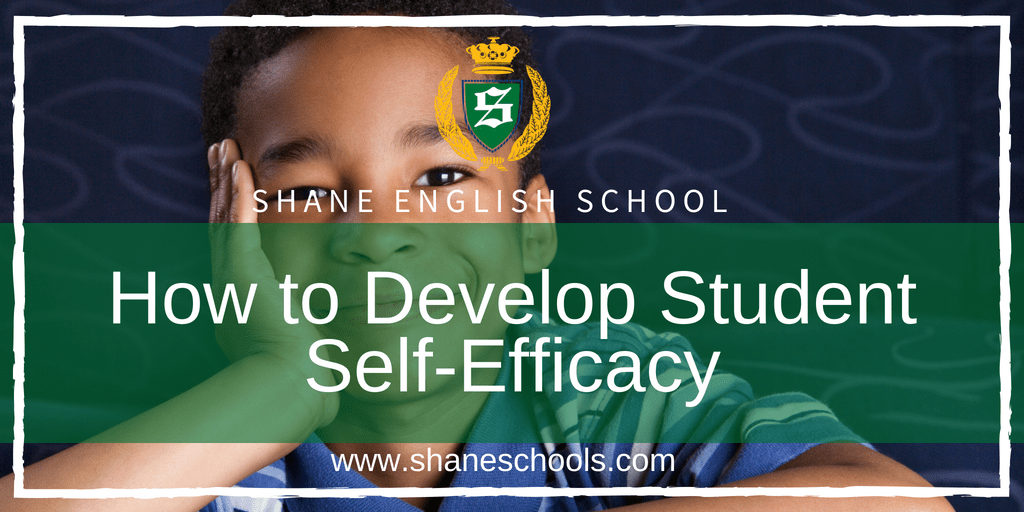Student self-efficacy is a fancy term which educators use when talking about students’ confidence and belief in their ability to learn something. A student with strong self-efficacy learns quicker and is more confident using English than a student who does not believe in their ability to learn.
Confident students are more likely to keep trying when they make mistakes, be eager to try harder tasks, stay motivated to learn the language and feel more at ease when using English than students with low efficacy. Developing your students’ self-efficacy should, therefore, be high up on your agenda. Albert Bandura, a renowned psychologist from Stanford University, published extensively on the topic of self-efficacy. His 1994 paper on self-efficacy is particularly influential and the theory from that paper is applicable to the classroom and you can use it to help your students to grow as learners. Badura explains that there are four main factors which contribute towards self-efficacy. Knowing about them will help you to boost your students’ confidence and could also help you to become a more self-efficacious teacher.
Personal Experience (Mastering Skills on Their Own)
According to Bandura the most effective way to increase confidence in our abilities is through getting first-hand experience at doing something. The idea is simple: when students master a new English skill or successfully complete a language task, their belief in their language abilities will increase. The important thing here is that you gauge the difficulty of the tasks correctly – tasks that are too easy will not challenge your students, while tasks that are too hard can be discouraging. If your students get used to always succeeding at easy activities, they might get easily put off trying when they are faced with more difficult language exercises. To ensure your students succeed at complex tasks and reinforce their self-efficacy, take time to explain how to approach these tasks and what needs to be done to complete them. Completing sufficiently difficult tasks will help your students to become more confident in their language abilities.
Vicarious Experience (Seeing Others Succeed)
Seeing someone else attempt and complete a task can help us to imagine ourselves doing the same and hence increase our self-efficacy. According to Bandura the more similar the person completing a task is to ourselves the stronger our belief that we can have the same accomplishment. A language classroom provides a perfect setting for learning by observing peers, as all the students are there to learn English and quite often also share many other common traits, such as age, cultural background and previous experience. To facilitate peer learning in your classroom, make sure to include many group activities in your lessons. For some brilliant ideas for pair work, follow this link to a Shane English School Teaching Tips article.
Social Persuasion (Receiving Verbal Encouragement)
Sometimes it’s possible to simply persuade your students that they are good at something. This can be done by reminding them of past achievements and encouraging them to continue, letting them know you believe they will succeed. Praising your students when they did well is also important, but you need to be genuine and credible, so don’t exaggerate achievements. When giving feedback and encouragement, rather than comparing students, focus on the student’s past performance. If a student failed at the task, explain why they were unsuccessful and what they can try to do differently next time to improve. Highlight that failure is not a reflection of how smart they are and encourage your students to try again. If you succeed in encouraging your students to persevere and complete a task, then your words will aid them in getting that valuable first-hand experience mentioned above.
Somatic and Emotional States (How Learning Makes Them Feel)
Your students will have different feelings about learning English, some will enjoy it, while others might find it an intimidating experience. A tense and stressed student is more likely to negatively interpret their language abilities, while a happy student would be more likely to have a higher opinion of their language skills. Our emotions do not just affect our mental state but can also how we feel physically. Stress, in particular, can cause your students to feel fatigued and have trouble concentrating in class. To increase student self-efficacy, try to make your classroom a welcoming, relaxed, friendly, and as stress-free a place as possible. If your students feel at ease they are bound to perform better and consequently feel more comfortable using English.
Your Own Self-efficacy
As well as working on developing your students’ self-efficacy, remember to also work on developing your own. If you are confident and comfortable in your teaching you will be a positive role model for your students. With strong self-efficacy, you will also find it easier to motivate your students and to try fresh teaching methods in the classroom. If you need some advice on how to become more confident when speaking to your class, check out this blog post from Shane English.
About the Author
Aleks Kaye completed a blended CELTA course while working full-time in Student Support at a university in the UK. Since 2016 Aleks and her husband David have been on the road, travelling the world. You can read about their adventures at daleksabroad.travel.blog.

We're hiring!
With schools around the world, Shane English School always has exciting new opportunities to offer.


